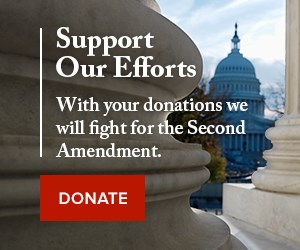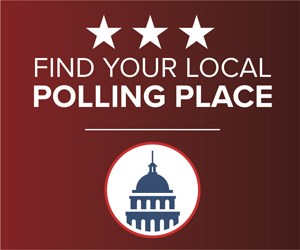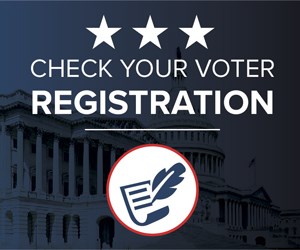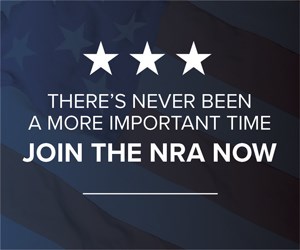Chris W. Cox took over as the Executive Director of the NRA Institute For Legislative Action in 2002. Chris and ILA have had some incredible successes, but we now face some of the greatest threats ever to our Second Amendment rights. We recently caught up with Chris to give NRA members the inside track on how the fight for firearm freedom has been going, and what we can expect in the future.
AMERICAN RIFLEMAN: Chris, you've been with the NRA for 12 years, heading up the NRA Institute for Legislative Action for the last five. Exactly how do you view NRA-ILA's primary mission?
CHRIS COX: I can give you the answer in five words: "ILA exists to influence legislation." Influencing legislation--whether you're talking about backing a proactive bill such as the Protection of Lawful Commerce in Arms Act in Congress or defeating a gun ban at the state level--requires concerted efforts in many different areas by many different people.
Of course, you influence legislation directly by lobbying legislators, and you do that effectively only by understanding that there are many forces and factors that influence their thinking and actions. Appreciating the entire dynamic and understanding how to honestly persuade--to press the right button at the right time--is what successful lobbying is all about. And NRA members and their friends should be proud that NRA is the most genuinely respected grassroots lobby in America.
AMERICAN RIFLEMAN: And ILA does more than "lobby" in the sense that most of us use that word.
CHRIS COX: You're right, of course. A vigilant defense of the Second Amendment requires far more than direct lobbying. We have to carry on extensive fundraising activities. We must communicate regularly with our members. We have to maintain a strong legal team to fight anti-gun challenges. It's also important that we maintain a research base to document NRA positions, not only to legislators but also to the media and to the general public through effective public relations campaigns. After all, ILA was created to persuade those who may disagree with us as well as to support our political friends and defeat avowed enemies.
AMERICAN RIFLEMAN: How do you see the fight to protect our Second Amendment rights changing over time?
CHRIS COX: I have to admit that sometimes we are tempted to think that the political battles we fight have never been fought before. Some believe that if we win this particular fight, our victory means we'll never have to fight it again. The truth is, and America's Founding Fathers certainly understood it, good people have always had to fight against despots who sought to take away their means to defend themselves. The fight began when the first ruler decided that the people couldn't be trusted.
The historical record is clear. There always will be those who seek to disarm free people. That certainly is the case today, whether you're talking about George Soros and his cronies at the United Nations, Michael Bloomberg and his gang of anti-gun mayors, or the "F-Troop" on Capitol Hill. The only difference is that today's anti-gun politicians, such as John Kerry in 2004, don't have the guts or the honesty to admit their real agendas.
AMERICAN RIFLEMAN: What then do you see the future as for our Right to Keep and Bear Arms?
CHRIS COX: As they say, all we know with certainty about the future is that's where we'll spend the rest of our lives. However, I am sure of one thing--the American people will never surrender their guns. The personal right to own firearms has been widely acknowledged and accepted since the birth of our nation. The recognition of the inherent right to bear arms sets us apart from the millions of enslaved and oppressed people of other nations. The Right to Keep and Bear Arms has always marked us as free citizens; it marks us as Americans.
AMERICAN RIFLEMAN: And yet aren't there people who honestly believe that we would be better off if America were to become a gun-free nation? How do you explain that?
CHRIS COX: First, many of these are people who have decided that, absent any evidence to the contrary, you and I and tens of millions of our fellow citizens cannot be trusted and, therefore, must be controlled.
But, you're right, there are good folks out there who support restrictive gun-control schemes. They either do not see the harmful downside or they see it and it doesn't concern them. Some of them just want to feel good about themselves.
It falls to us to help these folks see the error in their thinking. We also have to reach the vast number of Americans who don't care about our issue one way or the other. We need to educate them about responsible gun ownership so they'll come to understand why they do need to care. We need to effectively make the case that the Second Amendment is the right that secures all others. That's what we're trying to do.
AMERICAN RIFLEMAN: Chris, what are the most rewarding and frustrating aspects of this challenging job?
CHRIS COX: The things that are the most frustrating, obviously, include dealing with the national news media that shamelessly portrays NRA's position in a negative light, and flat-out misrepresents and lies as to what our positions are. A recent example is the terrorist watch-list issue, where they were suggesting the NRA wants terrorists to have access to firearms, which obviously couldn't be further from the truth. Our members have fallen in Afghanistan and Iraq, and they serve as law enforcement officers and first responders all over the country. We are completely anti-terrorist. We believe in civil liberties and that the Constitution actually means something. To allow an un-elected bureaucrat to have arbitrary authority to deny an American citizen--without due process--the right to own a firearm is outrageous.
Whether it comes from Alberto Gonzales, Frank Lautenberg, Hillary Clinton or anyone else, we are going to fight them. That's what we do every day.
People ask me about how I deal with the Chuck Schumers and the Hillary Clintons ... well, that's part of the job. I'm really more concerned, both personally and professionally, by the fact that there are a lot of gun owners in this country who have bought into the lies of the national news media and gun-control groups.
I was recently on a quail hunt in Georgia, and I spent my entire weekend explaining to a federal judge that the Clinton gun ban, a federal law that sunsetted in 2004, had nothing to do with machine guns. I had to explain the same thing to a doctor. I had to explain to two union workers again that the gun ban that expired in 2004 had nothing whatsoever to do with machine guns. And these were all hunters. But that perception exists within our like-minded family and people who enjoy the shooting sports and enjoy all the great fruits of our labor and all the side benefits of the Second Amendment.
It's disappointing that people who should know better don't. But that's the job all of us have as NRA members--to make sure this message gets out there, and gets out to our friends who should know better but who, for whatever reason, are not NRA members. It's one of the many reasons people should join the nra, because you will be able to get the truth where you are not going to get it from the national news media.
AMERICAN RIFLEMAN: One of the most misunderstood issues right now concerns the Tiahrt Amendment. A lot of people say, "What is the deal here? I don't get this." Could you explain what that is and why it is important?
CHRIS COX: One of the first cities to sue the gun manufacturers for third-party criminal issues and non-defective firearms was New York City. In the debate before we passed the Protection of Lawful Commerce in Arms Act (PLCAA), New York City's suit was cited as a poster child for junk lawsuits. The city of New York--led by Mayor Bloomberg--is defying the clear intent of the plcaa and is desperately trying to keep that lawsuit against the gun manufacturers alive. And they want to abuse law-enforcement data to reach that end.
Law enforcement--including the Fraternal Order of Police, the U.S. Justice Department and the Bureau of Alcohol, Tobacco, Firearms and Explosives--all agree with the National Rifle Association's position. It's a complicated issue. A gun is traced for a variety of reasons. It might be traced if it's found at the scene of a crime. But it may also be traced if it's found in an abandoned building. If police are sent to an area for another reason but a firearm is present, they may do a trace.
The Congressional Research Service (CRS) and the Justice Department have both said you can't use trace data to determine crime statistics because guns are traced for reasons other than crime. But the gun-control community, their friends in Congress and their friends who are activist judges all over the country, take that data and try to manipulate it into suggesting somehow that gun dealers or gun manufacturers are responsible for the acts of criminals.
But there are several reasons that Congressman Tiahrt felt it was necessary to try to make restricting access to trace data public policy. One is the privacy of gun owners. Two, releasing this data to the general public impedes legitimate law-enforcement investigations. That is the primary reason that fop and the Justice Department and BATFE all support the current practice.
Mayor Bloomberg, again with the help of the gun-control community, continues to misrepresent--if not flat-out lie about--what Tiahrt does and also what Tiahrt does not do. There is nothing in Tiahrt to prevent law enforcement from sharing trace data, or any other data, during a bona fide criminal investigation.
We are standing side-by-side with law enforcement. The Brady Campaign and Michael Bloomberg are standing side-by-side with the activist judges and the gun-control groups that want to sue the gun makers and gun dealers out of business. That's what this is all about. It's intellectually dishonest. It's shameful, but that's what we have come to expect out of the gun-control groups and anti-gun politicians.
AMERICAN RIFLEMAN: Is there another issue that you'd like to address?
CHRIS COX: You'll remember when the Brady Campaign's Sarah Brady told the Tampa Tribune, "To me, the only reason for guns in civilian hands is for sporting purposes." Recently, she actually claimed in an Associated Press interview that she supports the Second Amendment and said: "I have no opposition to law-abiding people having weapons in their house, none whatsoever." That's a slight disconnect.
The Brady Campaign has changed its name a number of times, its rhetoric, its talking points, but it hasn't changed its policy positions. And it's been almost entertaining to hear Sarah Brady and Paul Helmke talk about their "support" for the Second Amendment, their support for individuals being able to own guns and keep guns in their homes.
I remember well their real position--I worked on Capitol Hill in the early '90s when the Brady Campaign opposed the Instant Check System, because they wanted a five-day wait. Their public position was that they wanted a mandatory permanent waiting period of five-day waits, seven-day waits, 14-day waits, but what we hear today is either revisionist history or a flat-out lie. I haven't figured out which one is the case. They talk about supporting an individual's right to own a firearm, they talk about supporting self-defense. But Sarah Brady has said that we need to get all the guns out of the homes. Their national board member Dianne Feinstein has said, "If I could get 51 votes in the Senate, Mr. and Mrs. America, turn them all in," she would do it.
They've argued in court against giving lawful residents of the District of Columbia the right to keep a loaded gun in their homes to defend themselves and their loved ones from criminals who break in. So again, their rhetoric and their talking points are very different from the reality of their policy positions. Again, it is both intellectually dishonest and shameful.
After the horrible events at Virginia Tech, they were right there trying to exploit yet another tragedy. It was disgusting to see a fundraising solicitation from the Brady Campaign asking for $32--one dollar for every person murdered in cold blood on that tragic day. But again, that's the real Brady Campaign. That's the true gun-control movement. They've changed their colors, they've changed their talking points, but they are still the same group who hates our freedom. And despite what they say in tv interviews, look all over the country. Look at what they say in court, and compare it to what they do. Their rhetoric does not match their actions.
AMERICAN RIFLEMAN: Let's wind up with the 2008 elections. What do you see happening next year?
CHRIS COX: I don't know anyone who can tell you today what is going to happen on Nov. 4, 2008. Anyone who thinks he can should catch the next plane to Las Vegas. Seriously, though, I've heard a lot of "gloom and doom" scenarios about 2008 and it's obviously a critical election cycle. I hope in future months to be able to give your readers first-hand reports on the changing political and legislative landscapes.
For now, let's return briefly to talking about influencing legislation. Elections clearly matter a great deal. Every year NRA's political action committee, the NRA Political Victory Fund, has to raise tens of millions of dollars to defend the Second Amendment. We can't use either NRA member dues or contributions to ILA to support our friends and defeat anti-gun candidates.
The generous support provided to the NRA-PVF by concerned NRA members has made a difference in federal, state and local elections across the nation. I think it's safe to say that if our members had not answered the financial call and had not been active at the grassroots level, today we'd be in year number 15 of the Clinton-Gore presidency. The ILA staff is well aware of that fact and works every day to repay that debt.













